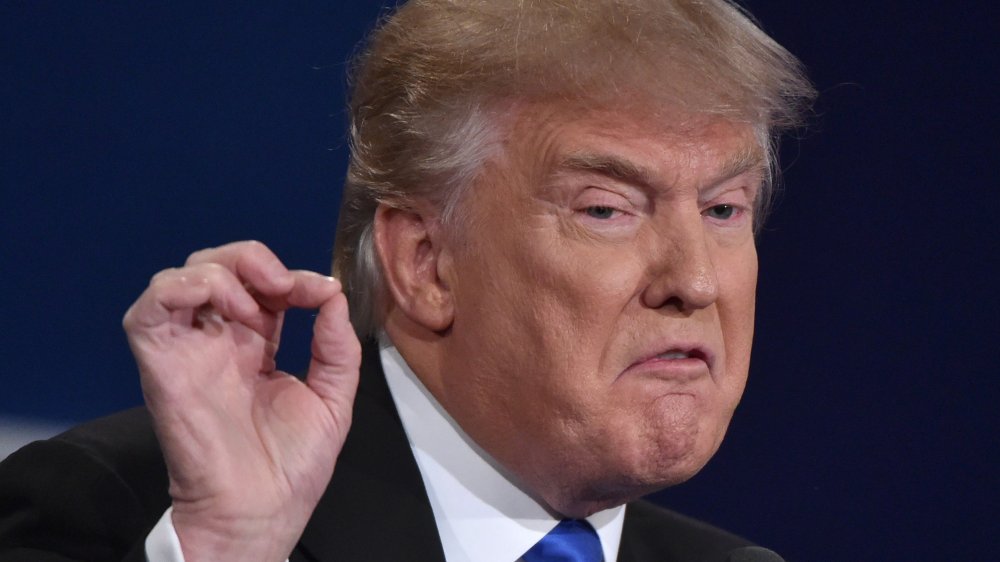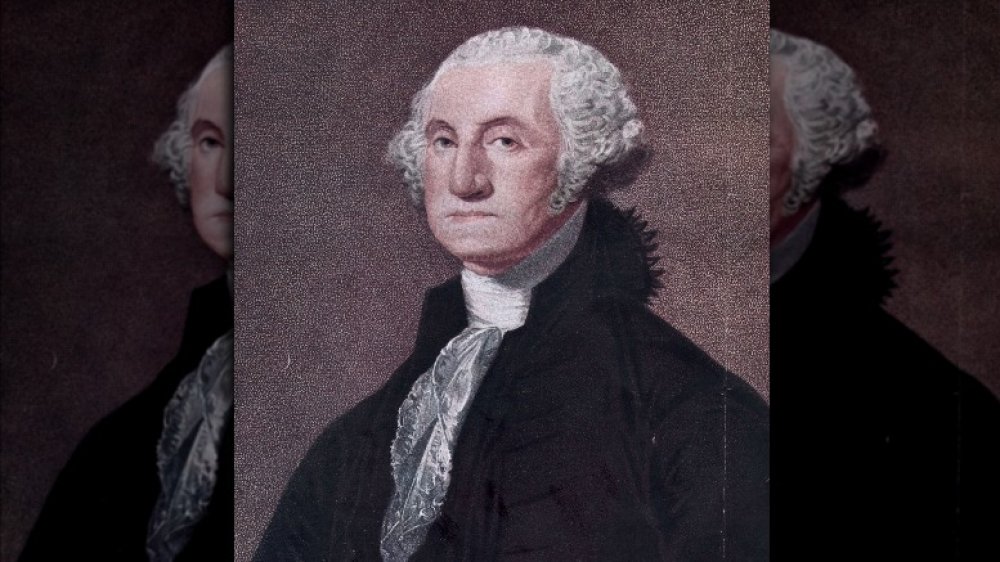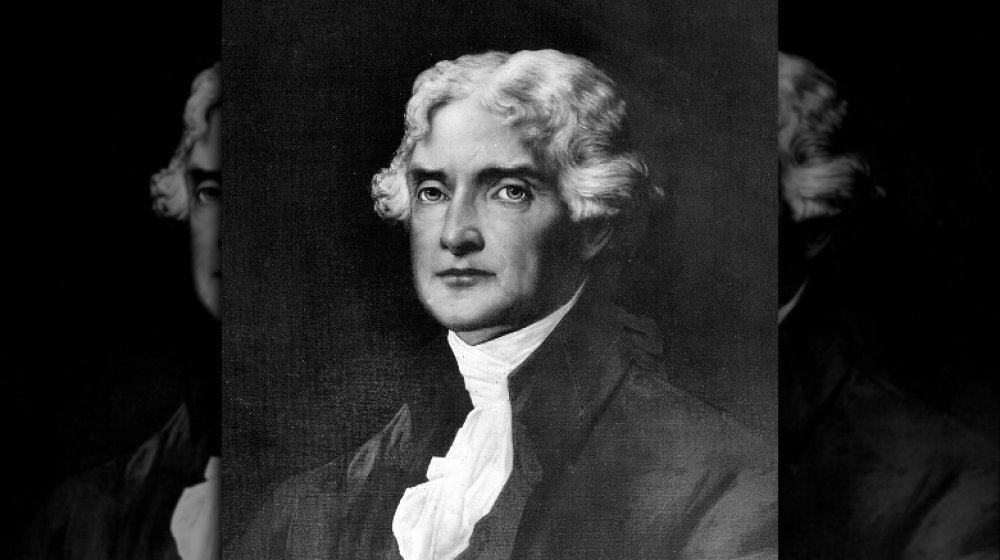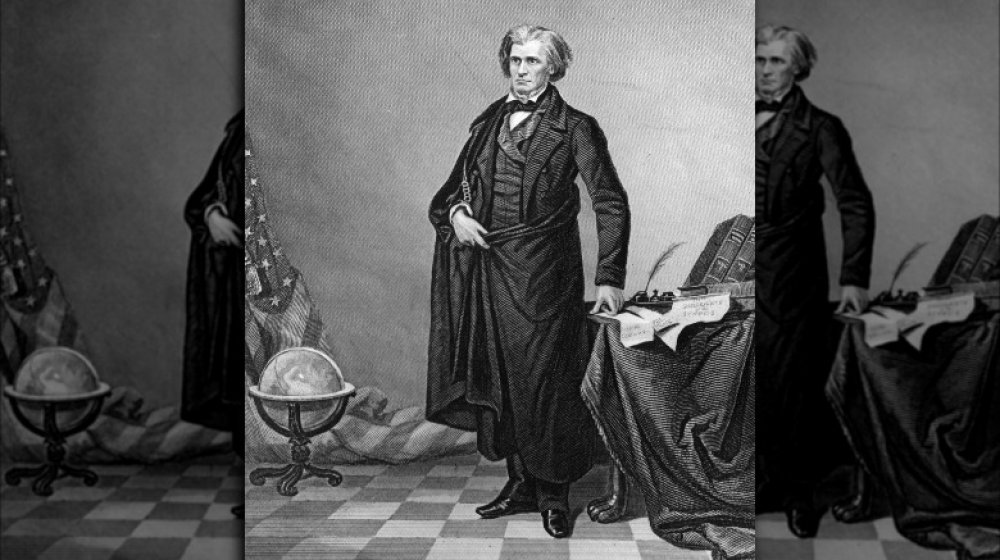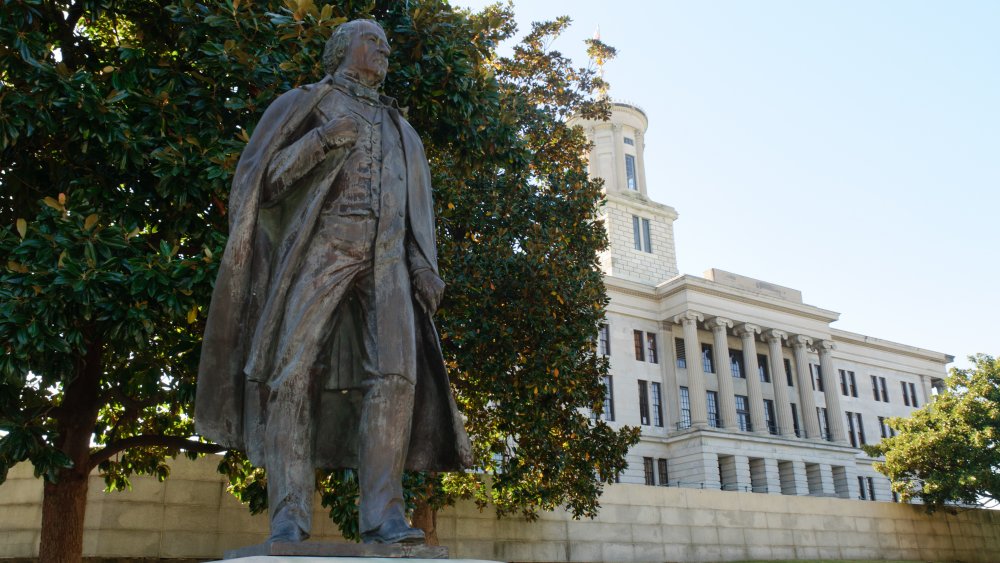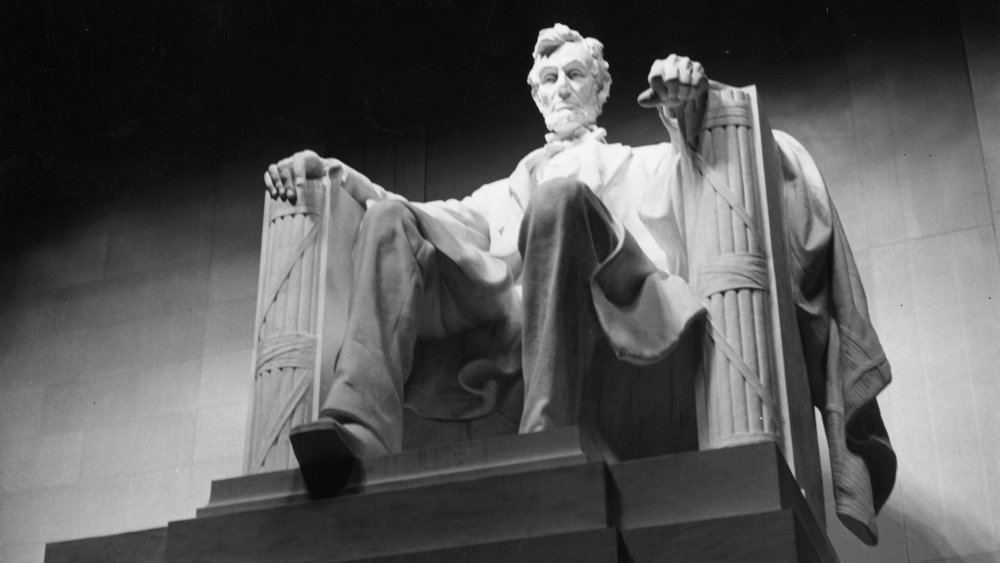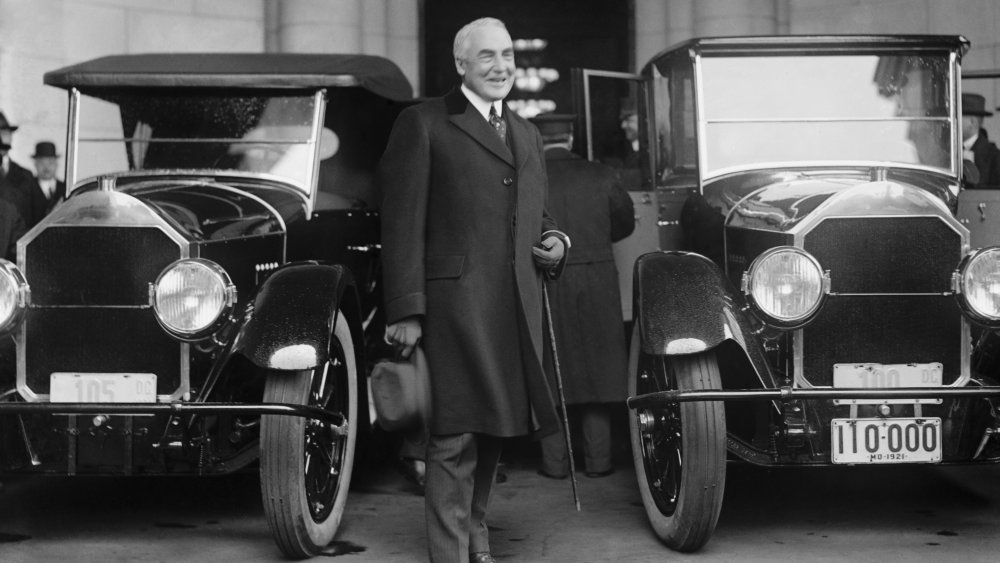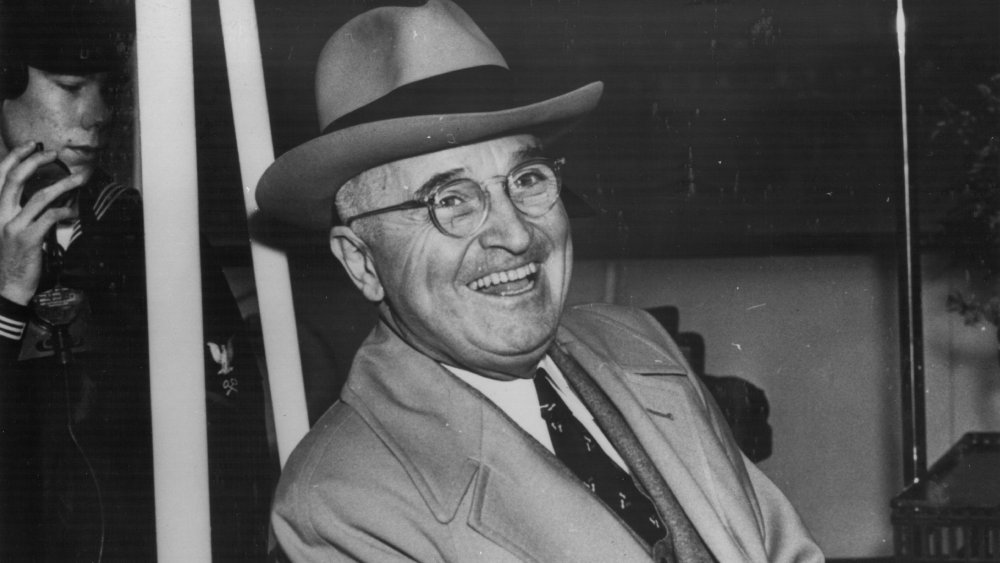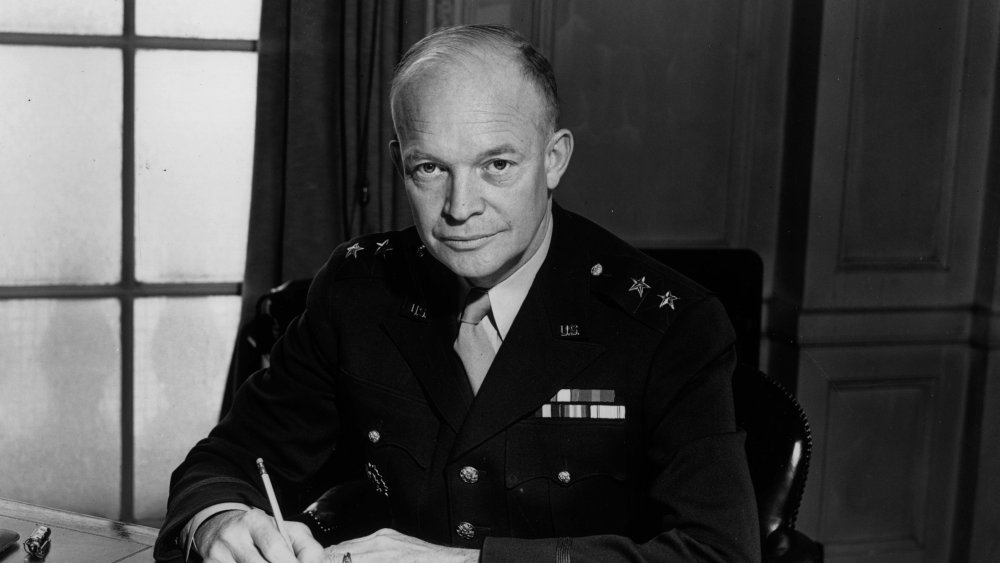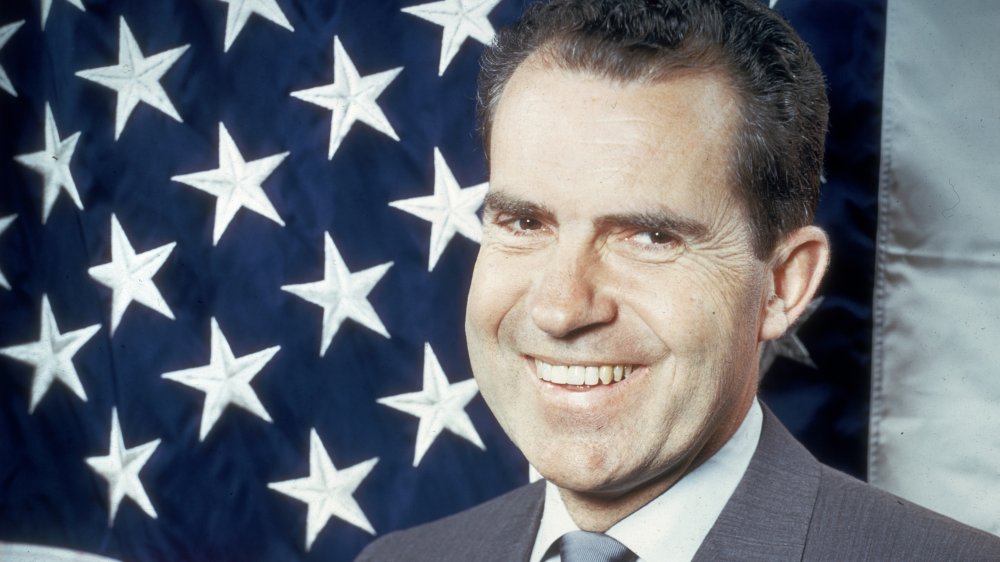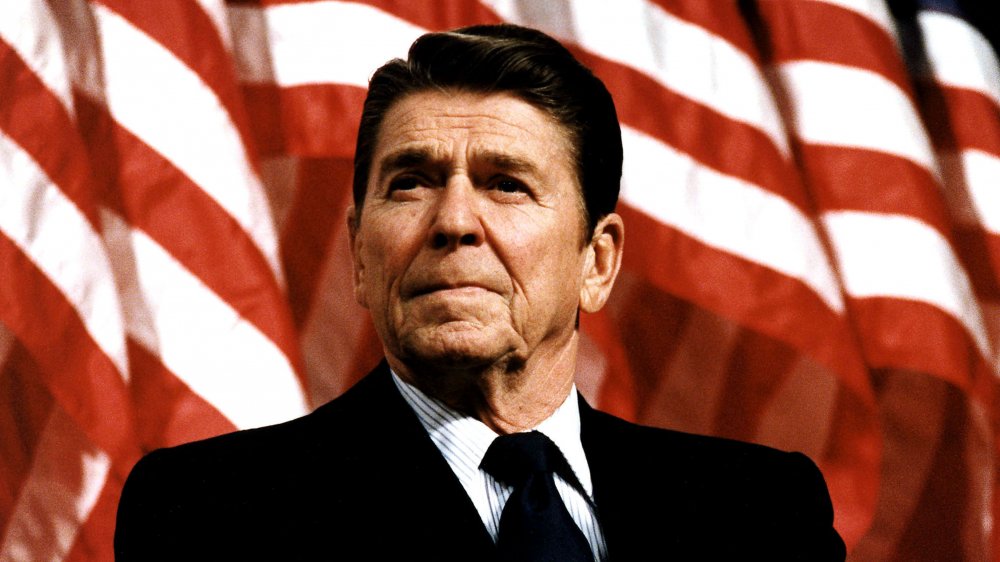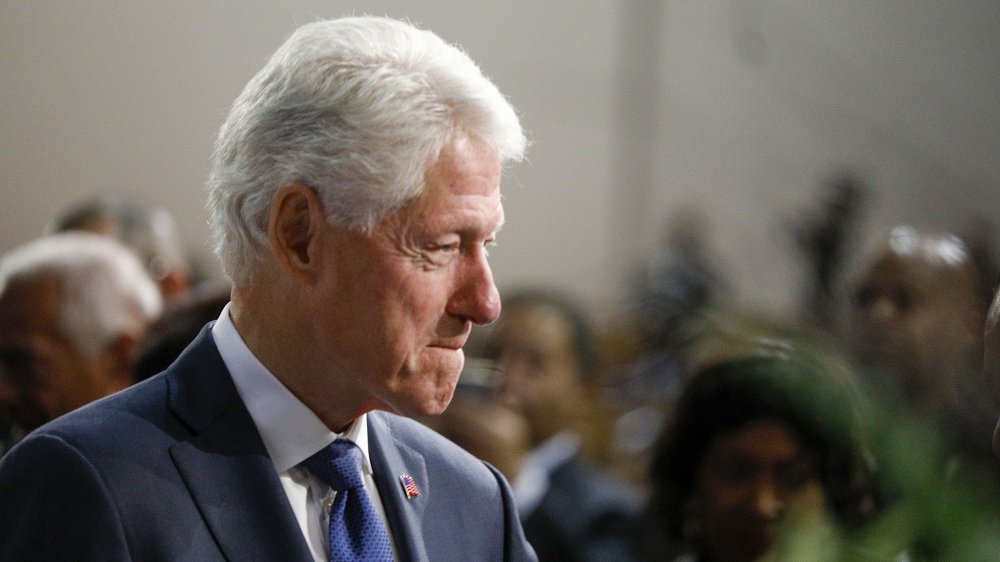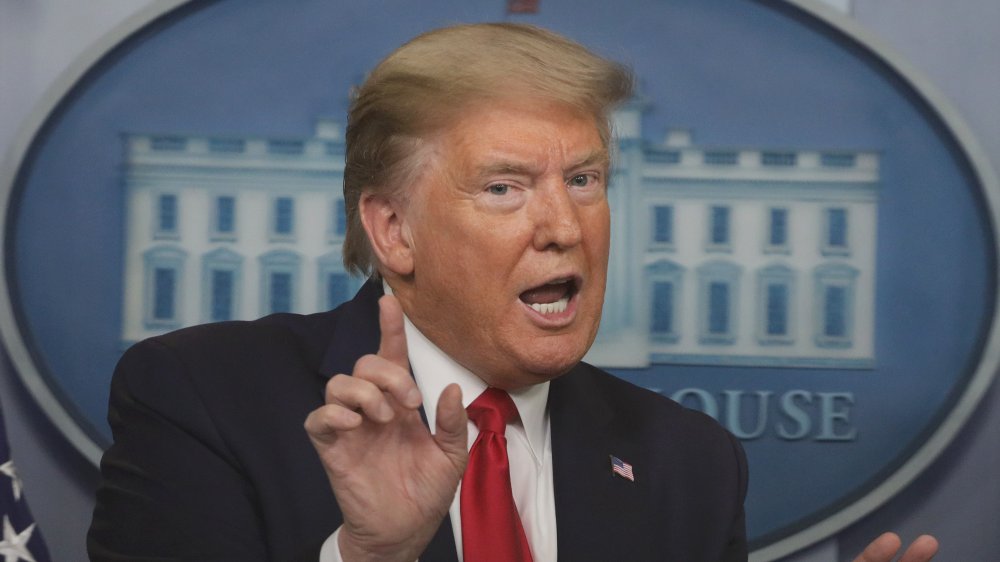Times That U.S. Presidents Totally Lost It
There are presidential duties and presidential pardons and presidential libraries, but there is also "being presidential," which is what we say when a president speaks eloquently and intelligently, stays humble, and doesn't lose his cool. Throughout the relatively short history of the United States, most of the 45 presidents have managed to be presidential most of the time, except of course when wearing a tan suit. But even presidential presidents are human beings, and sometimes they lose it. When they lose it in public, well, history remembers.
Just in case you think that presidential meltdowns are limited to just a handful of our past and present commanders in chief, they're not. Lots of presidents have had public and semi-public meltdowns — and if you think about it, it's not really surprising. When was the last time you melted down because your bank charged you 35 bucks for being four cents overdrawn, or because your neighbor's dog pooped on your lawn? Now take on all the problems of the free world and try not to have an occasional meltdown. And with that context, let's take a look at some of the times that American presidents totally lost it.
Even George Washington had an occasional tantrum
As school kids, we Americans are taught that George Washington was cool and collected almost to the point of being kind of superhuman. After all, he chopped down the cherry tree and then calmly fessed up to it, although that story is totally fake so it really has nothing to do with anything. Anyway, the image of presidential, stern-faced, super-serious George Washington is engraved in our minds and on our dollar bills and nothing will ever shake it, except for this one story about how George Washington beat a bunch of soldiers with his riding cane as they fled British soldiers at Kip's Bay. According to the Revolutionary War Journal, he also aimed his unloaded pistol at the retreating men and repeatedly pulled the trigger. Finally in frustration he flung his hat on the ground and whined, "Are these the men with whom I am to defend America?" His tantrum was so complete that an aide had to lead his horse away by the bridle in order to save him from the advancing enemy.
The hat-flinging thing, as it turns out, was kind of a thing for Washington. On at least one occasion, Washington flung his hat on the floor and stomped on it after reading something he didn't like. Just in case you think that was just a wild rumor, the tale was told by none other than Thomas Jefferson, so you know, it must be true.
Thomas Jefferson wasn't exactly a cucumber either
Like George Washington, the rest of our Founding Fathers have "we're doing the important business of building a nation" faces and you just can't imagine any of them ever cracking a smile or laughing, or the opposite, melting down in a red-faced fit of rage. Welp, as it turns out, more than one of them had a temper. On at least one occasion John Adams referred to our first president as an "old muttonhead," though that doesn't exactly rise to the level of "losing it." Thomas Jefferson, on the other hand — you know, the guy who wrote the words "all men are created equal" — had kind of a dark side.
Now first of all, we know that he didn't mean everyone is created equal, because he specifically left out women and he also owned a bunch of slaves. He was certainly gracious and civil to those who shared his social status, but anyone he thought beneath him got treated exactly as if they were beneath him. Here's a fine example, as described in the book Thomas Jefferson's Lives: Biographers and the Battle for History: Jefferson and his daughter were taking a ferry across a stream when the two ferrymen got into an argument that was clearly about to become violent. Instead of standing by or trying to separate the two men, Jefferson grabbed an oar and brandished it at the pair, threatening to knock them overboard while shouting, "Row for your lives!"
A lot of those early presidents seemed to lose it rather violently
Andrew Jackson wasn't exactly known for being a nice guy, in fact, he's probably one of the biggest piles of chicken doodey to ever sit in the Oval Office. One of them. Anyway, besides signing the Indian Removal Act, which led to the forcible relocation and deaths of thousands of indigenous people, Andrew Jackson also had a temper, although we'll let you decide whether his clear over-reaction during this particular incident was at all justified.
According to History, Jackson was leaving a state funeral when an unemployed house painter named Richard Lawrence tried to shoot him. Luckily for Jackson, the gun misfired. Unluckily for Richard Lawrence, the gun misfired. Jackson saw red, raised his walking cane and beat Lawrence with it a couple of times before the would-be assassin pulled out a second gun, which also misfired. In the end, aides had to wrestle the 67-year-old Jackson off of his attacker, not the other way around.
Just as a side note, a century after this happened the Smithsonian decided to open an investigation into the misfiring guns, because reasons, and concluded that the odds that both of them might misfire during an assassination attempt were roughly 125,000 to one. So clearly, someone up there, or possibly down there, depending on your perspective, didn't think Jackson was a pile of chicken doodey.
Andrew Johnson got drunk before Lincoln's inauguration
Andrew Johnson was the 17th president of the United States, but before he was president he was Abraham Lincoln's vice president. His whole career was basically just one terrible moment after another — he didn't become president by being elected, he inherited the job after the execution of his successor. And he was also the first American president to be impeached, so there's that.
But even before all of that went down, he didn't always behave like a stand-up guy, and that was pretty clearly demonstrated during Lincoln's second inauguration. Johnson got up in front of the crowd and made a rambling, drunken speech in which he bragged about being a plebeian (which loosely defined is a "commoner" of the Roman Empire), and then he said, and this is an exact quote according to the United States Senate, "I am a-going for to tell you here today, yes today, in this place, the people are everything." Which granted was a complete sentence so that makes him a better orator than some presidents, but during his time that dropped a lot of jaws.
This went on for 20 minutes, mostly because the people who could have stopped him were too polite to do much more than tug on his jacket. Evidently he hadn't quite embarrassed himself enough, though, because he ended the speech by basically making out with a copy of the Holy Bible, so there was that.
Honest Abe was honestly kind of a jerk sometimes
Abraham Lincoln, of all people, was at least one president who never, ever lost his cool, right? Well, no. According to The Inner World of Abraham Lincoln, even the stoic and sensible Honest Abe was prone to being unkind on occasion and on this occasion, he was actually unabashedly vicious, which is hardly the behavior we expect from the man who freed the slaves.
Lincoln had a few rivals over the course of his career, and one of them was Judge Jesse B. Thomas, who made an impassioned speech against Lincoln and got humiliated in return, not by the press or by hecklers but by the man himself. Lincoln showed up towards the end of Thomas' speech, disapproved of what he was hearing, and then took it upon himself to be profoundly nasty. In front of the same crowd, Lincoln viciously mocked his critic, and his words were so harsh and embarrassing that witnesses said Thomas "began to blubber like a baby, and left the assembly."
And this was hardly out of character for Lincoln, either. In 1842, he wrote an anonymous newspaper satire in which he called the state comptroller James Shields "a fool as well as a liar," among other things. Somehow, Shields learned the identity of the author and challenged Lincoln to a duel. Lincoln accepted, and the only reason the two men didn't skewer each other was because friends intervened and put a stop to it.
Warren Harding might have murdered Charlie Forbes if he hadn't been walked in on
For every public presidential met down there are about a bazillion private meltdowns, probably. We don't hear so much about them because, you know, private. But occasionally we do get a glimpse into the sorts of things presidents do to blow off steam when they think no one's looking, and it's not all gardening and stamp collecting, either.
According to New World Coming: The 1920s and the Making of Modern America, an unnamed White House visitor once walked in on Warren B. Harding apparently committing attempted murder on Charlie Forbes, an official from the Veterans Bureau. Harding had his hands around the poor dude's neck and was shouting, "You yellow rat! You double-crossing bastard!" And then when Harding realized he was being observed, he let go and said to his visitor, "I am sorry. You have an appointment. Come into the other room."
History doesn't seem to remember if the shocked visitor actually did go into the other room with the apparently murderous commander in chief, but evidently Harding had been responding to the news that Forbes had stolen thousands of dollars from the Veteran's Bureau, which Harding himself had established to help World War I veterans. So although choking someone is never really good policy, you can kind of understand why Harding lost his cool on that particular occasion.
Harry Truman wrote a threatening letter to a music critic
If you're a parent, you'll do anything to protect your child. Some parents kind of have a loose definition of "protect," though. Harry Truman's daughter Margaret was a singer who performed all over the nation and even sang at Carnegie Hall. She was successful enough that bad reviews should have washed over her, and maybe they did. They didn't wash over her dad, though, who seemed to take criticism of his daughter rather personally.
According to the Truman Library, after an appearance at Constitution Hall in 1950, a Washington Post critic named Paul Hume wrote, "Miss Truman is a unique American phenomenon with a pleasant voice of little size and fair quality — (she) cannot sing very well — is flat a good deal of the time — more last night than at any time we have heard her in past years — has not improved in the years we have heard her — (and) still cannot sing with anything approaching professional finish." Ouch.
The Truman Library doesn't note Margaret's reaction to this scathing review, but Daddy Truman was not pleased. He sent a letter to Hume which, among other things, called him "an eight ulcer man on four ulcer pay." "Someday I hope to meet you," he continued. "When that happens you'll need a new nose, a lot of beefsteak for black eyes, and perhaps a supporter below!" How presidential.
Dwight Eisenhower had a tantrum on the golf course
One of the little known prerequisites for becoming president of the United States is that you have to play golf. It's true! Actually it's not true, but no one would blame you for thinking so.
Dwight Eisenhower, like so many presidents before and since, was fond of golf. He also had a temper. According to the book Ike's Bluff: President Eisenhower's Secret Battle to Save the World, many of Eisenhower's friends and acquaintances swore off ever playing the game with him, not just because he was kind of aggressive but because he cheated and didn't seem at all ashamed of it. He was known to move his ball if he didn't like where it landed, and make "mistakes" when adding up his score. "He was about the lousiest sport who ever lived, in golf," said pro golfer Don January.
Another friend recalled a tantrum that nearly ended in injury: "The president was so mad on the 17th green when he made a bad explosion out of the trap and I yelled 'Fine shot!' He got so mad he yelled, 'Fine shot, hell, you son of a bitch,' and threw his wedge at me. The staff of the club wrapped itself around my shins and the heavy wedge missed me, otherwise I would have had a fractured leg."
Richard Nixon lost it for pretty much the entire year of 1970
Richard Nixon is mostly famous for being a crook, and for uttering the words, "I am not a crook." But according to Politico, for the entire year of 1970 Nixon was also paranoid, drunk, and not really doing a great job at holding onto his sanity. Henry Kissinger, who was serving as Nixon's National Security Adviser, remembered how he used to fall into rages, hang up on his aides, and sequester himself away in his office where he would stew over his problems and get angrier and angrier. At one point, he even snuck out of the White House in the middle of the night without any of his Secret Service and tried to connect with protestors at the Lincoln Memorial.
Nixon also drank heavily, and took sleeping pills, which would sometimes cause him to fall asleep in the middle of phone calls. On other occasions, he would get drunk and then talk about painful things that happened in his past. Once, on Air Force One, he broke down in tears talking about his parents and two brothers who had died in childhood.
Now keep in mind, this was all a couple of years before the Watergate break-in, so the downward spiral of paranoia and drinking and mental breakdown pretty much continued until his resignation in 1974.
Even Ronald Reagan had his moments
Before Ronald Reagan was president he was an actor, which means he was kind of already good at keeping his cool and projecting a presidential image even when he might not have been feeling totally presidential. According to the book Ronald Reagan: The Politics of Symbolism, though, Reagan did lose his temper rather spectacularly while he was running for governor of California.
At a convention of the National Negro Republican Assembly, Reagan and his Republican primary opponent were both asked about the Civil Rights Act. Specifically, the questioner wanted to know why black Republicans should vote for Reagan when he'd opposed the Civil Rights Act, and Reagan defended himself by saying that the bill was well-intentioned but poorly crafted. His opponent countered by saying that a vote against the bill was one of the worst things a member of the Republican Party could do, which was what really set Reagan off. "I resent the implication that there is any bigotry in my nature," he exclaimed. "Don't anyone ever imply that, in this or any other group." And then he stormed out of the room. Some observers even said he had tears in his eyes.
Monica is kind of a touchy subject for ole Bill
Bill Clinton got impeached over his affair with Monica Lewinsky. It was a big, ugly stain on his presidency and it was written down in the history books and today pretty much everyone who was an adult during that era can parrot the most famous things that were said and recognize the most iconic images from the scandal, and still Bill Clinton wonders why no one seems to have forgotten about it.
Clinton's most famous meltdown happened long after the scandal was over, when he was a guest on NBC's Today Show and he got asked how his relationship with Lewinsky might have played out during the "Me Too" era. His response to that question was basically to have a minor meltdown, in which he claimed to have apologized already so, you know, how dare you. He then suggested he'd paid his societal debt in the form of actual monetary debt (to the tune of $16 million, which The Washington Post says was probably not an accurate number). He also reminded viewers about his long history of doing great things for women, which is sort of the equivalent of saying, "Sure, I kicked that one homeless guy but look at all the quarters I gave to the rest of them." Oh and when he said he apologized, he didn't mean that he apologized to Lewinsky herself. When asked if he thought he should, he replied, "No, I do not."
Donald Trump loses it kind of a lot
Donald Trump has kind of a funny way of being presidential in that he's not presidential at all and doesn't really seem to care. And no one brings out his unpresidentialness more than the American news media. At this point, 45's unpresidential feuds with the media are legendary. Trump likes to be praised, and he doesn't like criticism, and when it comes to Donald Trump most members of the media are short on praise and long on criticism.
Trump doesn't answer critical questions with introspection or reassurance, the way most presidents before him have handled those questions, he just gets mad. Sometimes he melts down completely. During a 2020 COVID-19 press conference, in what the Guardian called an "extraordinary temper tantrum on live television," Trump responded to a question he didn't like by attacking the reporter who asked it.
"What do you say to Americans, who are watching you right now, who are scared?" asked NBC reporter Peter Alexander. "I say that you're a terrible reporter," Trump replied. "That's what I say. I think it's a very nasty question and I think it's a very bad signal that you're putting out to the American people."
